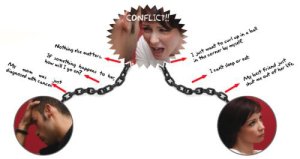Social and Emotional Curriculum: Obstacles to Happiness
How will you respond?
Your content has been saved!
Go to My Saved Content.The quest for happiness has two aspects: just as we're all searching for happiness, we're also trying to avoid pain in our lives. Yet dealing with the inner struggles, like self-doubt, anger, anxiety and fear is a vital part of how we grow.
It is a real advantage for anyone, including students, to learn to handle the ups and downs of life (resiliency), use tools to manage one's emotions (mindfulness), and also have the opportunity to build on one's strengths. When emotional issues are ignored, a person cannot have access to his or her full potential.
Improved Test Scores
The benefits of addressing the inner life and relationships even show up on test scores. CASEL reports: "A landmark review found that students who receive SEL instruction had more positive attitudes about school and improved an average of 11 percentile points on standardized achievement tests compared to students who did not receive such instruction." Everyone performs better and feels happier when their skill sets include:
- Emotional awareness and management
- Social awareness
- Relationship building and conflict resolution
- Identifying goals that are meaningful
Five Tools to Help Shift Perspective and Increase Happiness
1) Mindset Matters
Choose your mindset. When something bad happens you can choose to either put yourself down and succumb to the "inner critic," or you can recognize that the "inner critic" is trying to get a foothold and prevent that from happening. Let's say a presentation didn't go well. You can say either "I'm always bad at this type of thing" or "Next time I'll prepare and practice more." (Dr. Carol Dweck calls these the fixed mindset and the growth mindset.) It's good to know that we have the choice to approach every situation with a fixed or growth mindset.
2) Tap Into Your Inner Guidance System
Throughout life you are faced with contrasting experiences (i.e., those you want and those you don't). Within every one of us is an inner guidance system constantly reporting how each of these experiences feels (good or bad). When it feels good at your core, you are aligned with your true nature. When some part of you feels bad, you are off course. Check in with yourself, and take notice when something feels off. Every moment offers options. Consider the one that empowers your goals.
3) Everything is Connected
Have you ever experienced someone blowing up at you for no good reason? Oftentimes people's reactions to you have nothing to do with you at all. You may discover that something bad/sad/unfair happened to them earlier that day which caused them to be in a horrible mood. Like links in a chain, everything is connected to something that happened before. Understanding what has led up to someone's reaction really helps put it in perspective. Most often, it's not personal!

4) Eye of the Storm
Probably the most unsettling thing about being human is living with things over which you seem to have no power, like sickness, natural disasters and even other people's attitudes. While life can seem like a hurricane, there is a calm center which you can deliberately access by simple techniques such as deep breathing, taking a nature break, talking with a friend or just reminding yourself that you have a choice in how to respond to anything that comes your way. Even happiness is a CHOICE.
5) Defining moment
Often the people we admire the most discovered their greatness and genuine happiness when dealing with the darkest times of their lives (Eleanor Roosevelt, Gandhi, Martin Luther King). In this way, suffering was a defining moment to help them know who they really were and all they were capable of being. They found the opportunity in their adversity and grew stronger as they faced challenges. Everyone has this opportunity. The most important question is: "What can I learn from this?"
There is no denying that bad stuff happens -- it's part of life. The good news is that we have a choice in how we respond, and that choice directly affects our sense of well being. What do you do to make yourself happier?